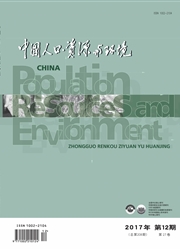

 中文摘要:
中文摘要:
少数民族农村地区物种丰富、景观独特,但由于经济发展水平和教育水平相对落后,其生态系统相当脆弱,极易遭到破坏.伴随传统文化的继承和发展,少数民族拥有自身独特的生活习惯和民族风情,不同少数民族对生态环境产生的压力及碳排放水平各不相同.而对碳排放现状的准确描述和估测,是明确改善方向,正确制定碳减排方针的基础和前提.因此,少数民族农户家庭的碳排放测算和评估对保持生态系统平衡及促进少数民族农村地区生态文明建设具有重要意义.农户家庭碳排放的主要来源是农业生产及生活能源消费.农业生产碳排放主要来自化肥、农药及地膜的生产和使用、土地翻耕、使用农用机械产生的化石燃料消耗、农业灌溉导致的电能消耗以及反刍牲畜肠道内发酵及排泄物中所含CH4,生活能源消耗产生的碳排放主要来自于煤炭、石油、天然气、电力、沼气等能源的直接消耗.本文选择云南回族、苗族、彝族、壮族、白族、哈尼族、傣族、纳西族、佤族等9个少数民族农户为研究对象,构建农户家庭农业生产和生活能源消费行为的碳排放结构模型,根据碳排放系数法,结合省级温室气体清单编制指南的测算方法,对农业生产过程及生活能源消费所引致的碳排放量进行测算,并从碳排总量,碳排强度以及碳排结构的对比情况对碳排放情况进行分析评估.通过对少数民族农户碳排放的影响因素分析发现,经济收入水平越高的少数民族农户碳排放量越高;地理条件越便利,农户的碳排放量越高;传统的风俗文化对少数民族农户碳排放亦有某种程度的影响关系.结合研究结果,建议从发展生态农业、改革传统风俗文化、优化能源结构、推广低碳科技应用和加大政府支持力度几个方面,系统科学地改善云南少数民族地区的碳排放,为加快生态文明工程的建设提供参考借?
 英文摘要:
英文摘要:
Rural areas that minorities lived in are of rich species and unique landscapes,however,the development of economic level and educational level are relatively backward,the ecosystem of areas minorities lived are quite fragile and easily destroyed.Due to the development of traditional culture,minorities have different ethnic customs and habits,so the pressure and the level of carbon emissions generated to the ecological environment are different.The accurate description and estimation of current situation of carbon emissions are the basis and premise of clearing direction and developing the right policies.Therefore,the estimation and accession of the carbon emissions minority rural households generated means a lot to the maintenance and construction of the ecosystem in minority areas.Agricultural production and life energy consumption are the main sources of carbon emissions in a farmer household.Carbon emissions of agricultural production come from using chemical fertilizers,pesticides and mulch,tilling the land,consuming fossil fuel and electricity,and CH4 generated from ruminant livestock.And carbon emissions of life energy consumption contain the utilization of coal,oil,natural gas,electricity,biogas and other energy sources.Based on building the farmer' s behavior model about agricultural production and life energy consumption,using the carbon emission coefficient method and the calculation method recommended in Provincial guidelines for the inventory establishment of greenhouse gas emission,the carbon emissions of agricultural production and life energy consumption by minority farmers in Yunnan,which including Hui,Miao,Yi,Zhuang,Bai,Hani,Dai,Naxi,Wa,were been calculated and evaluated from aspects of the total amount,intensity and structure.And by the analysis of factors that impact the farmer' s carbon emissions,conclusions were been made that emissions would be increased along with the growth of family incomes ; carbon emissions in places with convenient transportation are higher than the places with inc
 同期刊论文项目
同期刊论文项目
 同项目期刊论文
同项目期刊论文
 期刊信息
期刊信息
